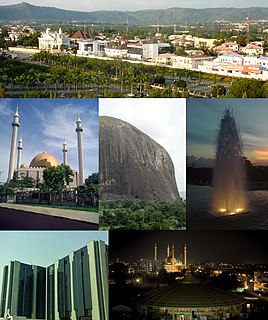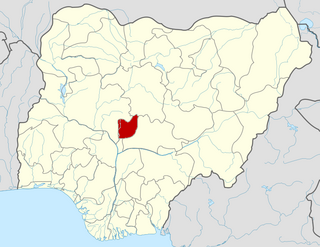Related Research Articles

Abuja is the capital and eighth most populous city of Nigeria. Located in the centre of the country within the Federal Capital Territory, it is a planned city built mainly in the 1980s based on a master plan by Japanese architect Kenzo Tange. It replaced Lagos, the country's most populous city, as the capital on 12 December 1991.

Kano is a city in northern Nigeria and the capital of Kano State. It is the second largest city in Nigeria after Lagos, with over four million citizens living within 449 km2 (173 sq mi); located in the Savanna, south of the Sahel, Kano is a major route of the trans-Saharan trade. The city has been a trade and human settlement for millennia. It is the traditional state of the Dabo dynasty who since the 19th century have ruled as emirs over the city-state. Kano Emirate Council is the current traditional institution inside the city boundaries of Kano, and under the authority of the Government of Kano State.

The Izon people, otherwise known as the Izon otu, are an ethnic group majorly found in the Niger Delta in Nigeria, with significant population clusters in Bayelsa, in Delta, and in Rivers. They are also found in other Nigerian states like Ondo, Akwa Ibom and Edo State. Many are found as migrant fishermen in camps as far west as Sierra Leone and as far east as Gabon. Population figures for the Ijaws are placed at just over 10 million, accounting for 5% of the Nigerian population. They have long lived in locations near many sea trade routes, and they were well connected to other areas by trade as early as the 15th century.

The Federal Capital Territory, commonly known as FCT, is a federal territory in central Nigeria. Abuja, the capital city of Nigeria, is located in this territory. FCT was formed in 1976 from parts of the states of old Kwara, Niger, Kaduna and Plateau States with the bulk of landmass carved out of Niger State. It is within the North Central region of the country. Unlike the States of Nigeria, which are headed by elected Governors, it is administered by the Federal Capital Territory Administration, headed by a minister appointed by the President.

Lokoja is a city in Nigeria. It lies at the confluence of the Niger and Benue rivers and is the capital of Kogi State. While the Oworo, Bassa Nge and Nupe are indigenous to the area, other ethnic groups of Nigeria, including the Kupa-Nupe, Hausa, Ebira, Igala, Igbo, Bini/Edo, and Tiv have recently established themselves. Projected to be the third fastest growing African continent city between 2020 and 2025, with a 5.93% growth. it's was listed a second class township by the 1917 township ordinance of the colonial administration. This shows that Lokoja is a old city.

The culture of Nigeria is shaped by Nigeria's multiple ethnic groups. The country has 527 languages, seven of which are extinct. Nigeria also has over 1150 dialects and ethnic groups. The three largest ethnic groups are the Hausas that are predominantly in the north, the Yorubas who predominate in the southwest, and the Igbos in the southeast. There are many other ethnic groups with sizeable populations across the different parts of the country. The Kanuri people are located in the northeast part of Nigeria, the Tiv people of north central and the Efik-Ibibio are in the south south. The Bini people are most frequent in the region between Yorubaland and Igboland.

Northern Nigeria was an autonomous division within Nigeria, distinctly different from the southern part of the country, with independent customs, foreign relations and security structures. In 1962 it acquired the territory of the British Northern Cameroons, which voted to become a province within Northern Nigeria.

Gbagyi or AGbari is the name and the language of Gbagyi/Gbari ethnic group who are predominantly found in Central Nigeria, with a population of about 1 million people. Members of the ethnic group speak two dialects. While speakers of the dialects were loosely called Gwari by both the Hausa Fulani and Europeans during pre-colonial Nigeria they prefer to be known as Gbagyi/Gbari. They live in the Niger, the Federal Capital Territory - Abuja, and Kaduna State. They are also found in Nasarawa central Nigeria Area. Gbagyi/Gbari is the most populated ethnic and indigenous group in the middle belt and Federal Capital Territory of Nigeria and their major occupation is farming. Pottery is also an occupation practiced by the women.

Nigerian Railway Corporation is the state-owned enterprise with exclusive rights to operate railways in Nigeria.
Nupe is a Volta–Niger language of the Nupoid branch primarily spoken by the Nupe people of the North Central region of Nigeria. Its geographical distribution stretches and maintains pre-eminence in Niger State as well as Kwara, Kogi, Lagos and the Federal Capital Territory.

Isoko people are an ethnolinguistic group who inhabit the Isoko region of Delta State, and Bayelsa State Nigeria. They are people of southern Nigeria, near the northwestern Niger delta. Delta State and Bayelsa State are part of the 36 states of the Federal Republic of Nigeria.

The Hausa are the largest ethnic group in West and Central Africa, who speak the Hausa language, which is the second most spoken language after Arabic in the Afro-Asiatic language family. The Hausa are a diverse but culturally homogeneous people based primarily in the Sahelian and the sparse savanna areas of southern Niger and northern Nigeria respectively, numbering around 53 million people with significant indigenized populations in Benin, Cameroon, Ivory Coast, Chad, Sudan, Central African Republic, Republic of the Congo, Togo, Ghana, Eritrea, Equatorial Guinea, Gabon, Senegal and the Gambia.
The Etsakọ people are the majority ethnic group in the northern region of Edo State, Nigeria. They are historically linked to the ancient Benin kingdom. Administratively, they presently occupy three local government areas of Edo State these are; Etsako East, Etsako West and Etsako Central, with Agenebode, Auchi, and Fugar as their administrative headquarters respectively

Christians in Nigeria comprise an estimated 49.3% of the population. Christians are dominant in the southern (south-east/south-south/South west and central region in Nigeria. According to the Pew Research Center, Nigeria has the largest Christian population of any country in Africa, with more than 80 million persons in Nigeria belonging to the church with various denominations. The majority of Christians in Nigeria are Protestant.
The Urhobos are people located in southern Nigeria, near the northwestern Niger Delta.
Yam is a staple food in West Africa and other regions classified as a Tuber crop and it is an annual or perennial crop. The New Yam festival is celebrated by almost every ethnic group in Nigeria and is observed annually at the end of June.
The Gwandara people are one of the tribes in Nigeria. They are located in some parts of Abuja, Nassarawa, Kano, Niger and Kaduna.
Dakarkari people also known as Lena are one of the ethnics group in Nigeria with approximate population of 136, 000.
References
- 1 2 3 Onyeakagbu, Adaobi (2018-10-09). "A brief walk into the lives of this ethnic group". Pulse Nigeria. Archived from the original on 2022-06-05. Retrieved 2022-06-05.
- 1 2 3 "Gade culture resurrects at dazzling festival". Daily Trust. 2018-05-09. Archived from the original on 2022-06-05. Retrieved 2022-06-05.
- 1 2 3 4 5 "Gade festival: Mysticism, masquerades, culture on display". The Sun Nigeria. 2018-05-09. Archived from the original on 2018-08-09. Retrieved 2022-06-05.